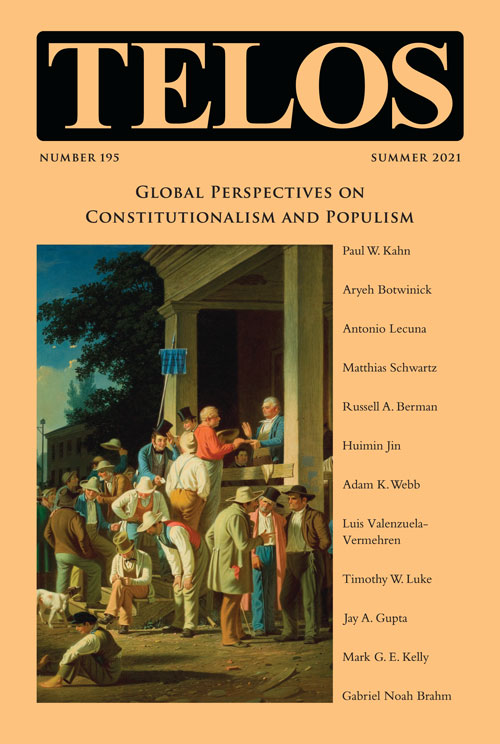In today’s episode of the Telos Press Podcast, David Pan talks with Matthias Schwartz about his article “Servants of the People: Populism, Nationalism, State-Building, and Virtual Reality in Contemporary Ukraine” from Telos 195 (Summer 2021). An excerpt of the article appears here. In their conversation they talked about the history of the Euromaidan and how it contributed to nationalism in Ukraine; the election of President Volodymyr Zelensky, who previously portrayed the president of Ukraine in the hit TV show Servant of the People; the way that Zelensky’s presidency undercut the nationalist form of politics by decoupling nationalism from populism; and the changes that Zelensky has (or has not) brought to Ukrainian politics. If your university has an online subscription to Telos, you can read the full article at the Telos Online website. For non-subscribers, learn how your university can begin a subscription to Telos at our library recommendation page. Print copies of Telos 195 are available for purchase in our online store.
|
In today’s episode of the Telos Press Podcast, David Pan talks with Aryeh Botwinick about his article “Contra Originalism: The Elusive Text” from Telos 195 (Summer 2021). An excerpt of the article appears here. In their conversation, they discussed the doctrine of originalism in constitutional theory, the role of the Bible in Western legal and constitutional history, the relation between originalism and skepticism, Derrida’s weak messianism, the way that Derrida’s skepticism undermines itself through the category of the gift, the relationship of originalism to the paradox of sovereignty, and the reason why Hobbes’s statement that “life is motion” is the only defensible phrase. If your university has an online subscription to Telos, you can read the full article at the Telos Online website. For non-subscribers, learn how your university can begin a subscription to Telos at our library recommendation page. Print copies of Telos 195 are available for purchase in our online store. In today’s episode of the Telos Press Podcast, David Pan talks with Adam K. Webb about his article “Supranational Governance and the Problem of the ‘Dignified Constitution,’” from Telos 195 (Summer 2021). An excerpt of the article appears here. Their discussion covers a range of topics, including the difference between the dignified constitution and the efficient constitution, the lack of a dignified constitution in supranational institutions like the EU and the UN, the domination of these institutions by the new class elite, the possibility of a global demos, the opposition of dignified constitutions to technocratic views of government, the insularity of some traditionalist arguments, and the current prospects for a broad global coalition. If your university has an online subscription to Telos, you can read the full article at the Telos Online website. For non-subscribers, learn how your university can begin a subscription to Telos at our library recommendation page. Print copies of Telos 195 are available for purchase in our online store. Telos 195 (Summer 2021): Global Perspectives on Constitutionalism and Populism is now available for purchase in our store. Individual subscriptions to Telos are also available in both print and online formats.
|
||||
|
Telos Press Publishing · PO Box 811 · Candor, NY 13743 · Phone: 212-228-6479 Privacy Policy · Data Protection Copyright © 2024 Telos Press Publishing · All Rights Reserved |
||||








